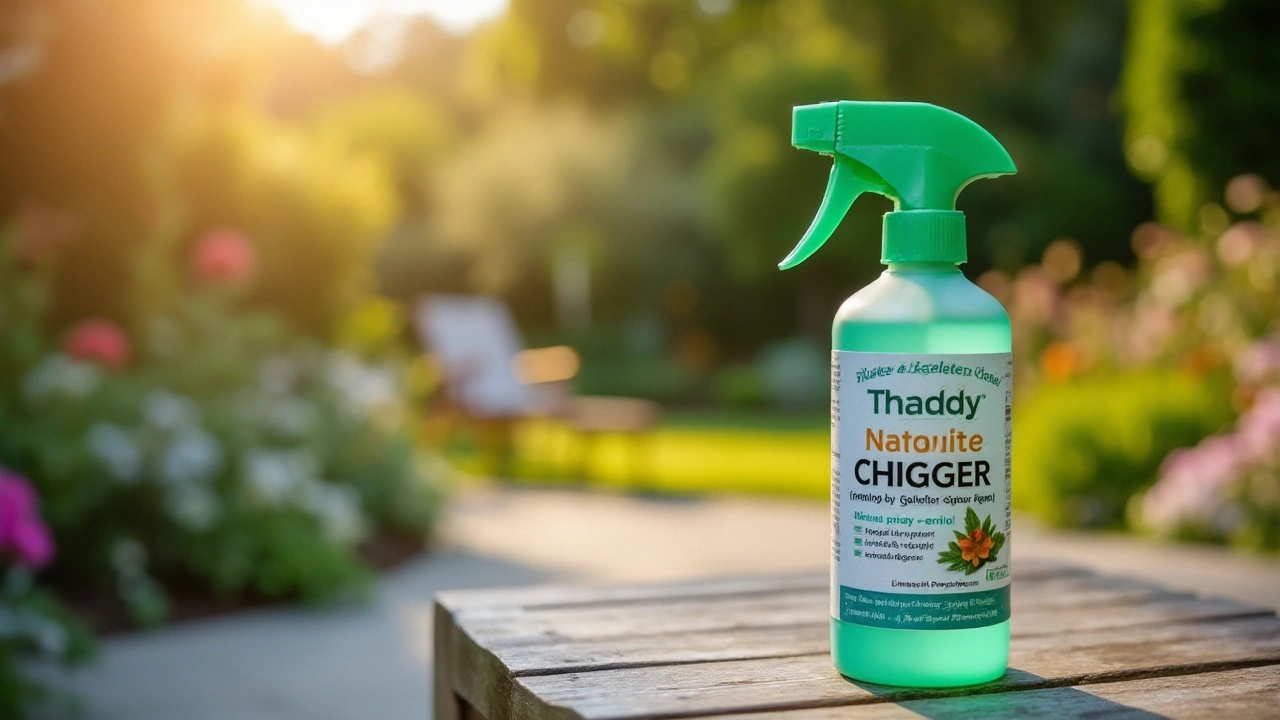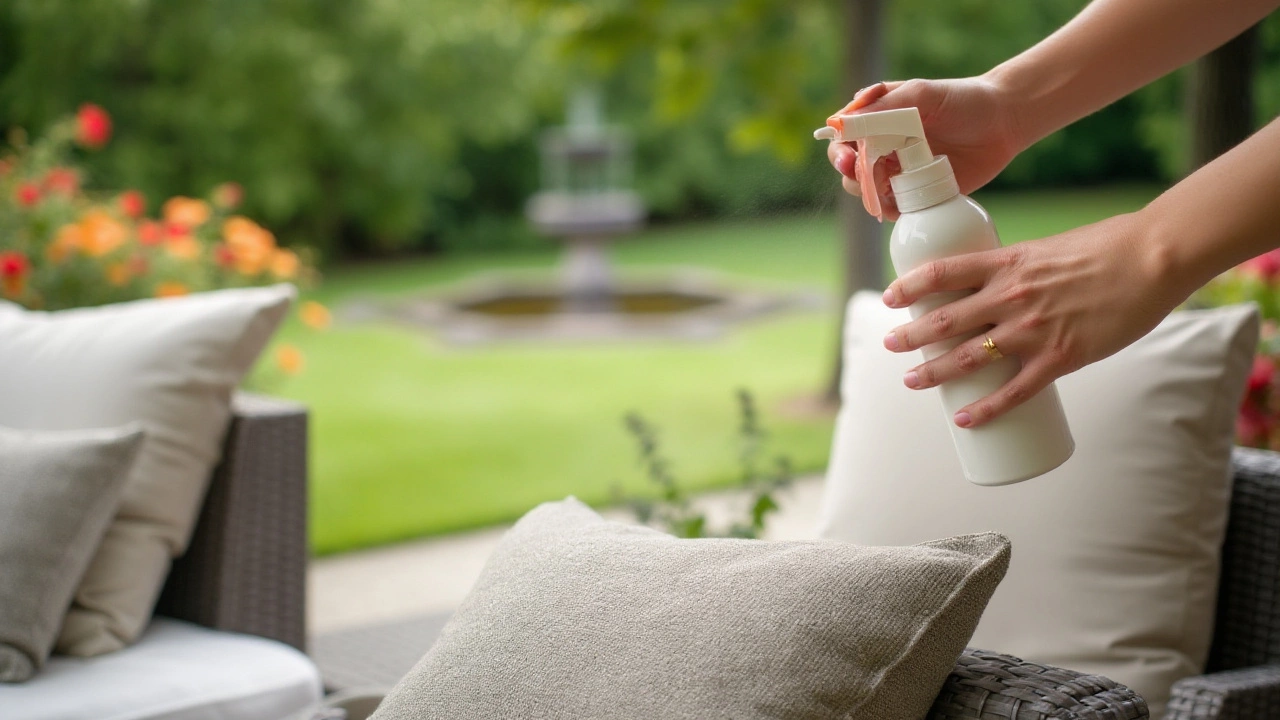
Chiggers might be tiny, but they can create big problems when it comes to enjoying garden furniture. These nearly invisible pests pack a powerful itch-inducing punch, leaving many of us scratching for answers. As we delve into the world of chiggers, we'll explore ways to swiftly tackle these nuisances, ensuring your outdoor space remains a place of relaxation and not irritation.
Recognizing the persistent itch that accompanies a chigger bite can turn a beautiful day in the garden into a troublesome ordeal. Fortunately, there are both immediate remedies and preventative strategies that can bring relief and peace of mind. From exploring chemical options to embracing natural solutions, we guide you in making your garden comfortable and chigger-free.
- Understanding Chiggers
- Impact on Garden Furniture
- Immediate Killing Methods
- Natural Remedies and Chemical Solutions
- Preventive Measures to Keep Chiggers Away
Understanding Chiggers
Chiggers are the larvae of mites, and although they are microscopic, their presence can be felt in the form of intensely itchy, red welts. These creatures, which belong to the Trombiculidae family, thrive in moist, grassy, or wooded areas. Despite their diminutive size, which often makes them invisible to the naked eye, chiggers are notorious for the discomfort they cause to humans and animals alike. They do not burrow into the skin, as commonly believed, but instead inject a digestive enzyme that breaks down skin cells which they feast upon. This process can lead to a pimple-like welt and relentless itching that can last several days.
Chiggers are most active in late spring to early autumn when the temperatures are warm and humid, providing optimal conditions for their life cycle. In regions like the southeastern United States, they are particularly abundant, though they can be found across the globe including temperate zones. These pests await their prey on the tips of grasses and plants, where they attach themselves and begin their short feeding phase. Interestingly, adult chiggers are not parasitic, instead preferring to feed on plant material and small insects.
Understanding their environment and behaviors can aid in devising effective pest control strategies. Chiggers prefer overgrown gardens and areas with thick vegetation. They are often found in damp areas, such as around streams or ponds and can easily find their way onto garden furniture via humans and pets. Awareness of the environmental conditions they favor is crucial; maintaining a tidy garden with trimmed grass and cleared undergrowth can help in minimizing their population. According to entomologist Mike Merchant, "Long grass and weeds provide a perfect haven for chiggers, especially if the area also offers shade."
An interesting aspect of these larvae is their need for a host. They require a host for their larvae stage and after feeding, the chigger drops off to mature into a nymph and then an adult. As such, reducing access to hosts can significantly impact their ability to reproduce. Investing in pest repellent solutions and wearing protective clothing while working or relaxing in potential chigger habitats can reduce the incidence of bites. Understanding what attracts chiggers is half the battle won in keeping these pests at bay.
Impact on Garden Furniture
The presence of chiggers can significantly affect the usability and enjoyment of your outdoor seating areas. These minuscule creatures, while mostly unnoticeable at first glance, can quickly turn a relaxing afternoon in your garden into an uncomfortable experience. Notorious for their excruciating bites, chiggers thrive in warm and damp conditions, which makes garden furniture a perfect lurking spot. They often hide in the soft fabrics and cracks found in outdoor seating cushions and woodwork, making it essential to understand their impact to effectively manage the menace.
One major concern with chiggers on garden furniture is the initial discomfort they cause to unsuspecting guests. Often, it's not until the itchy red welts appear that victims realize they've shared their seat with these unwanted guests. Such occurrences can render your outdoor space an undesirable location for gatherings or relaxation. Besides, the constant scratching can lead to skin infections if not managed carefully, turning a minor nuisance into a more significant health concern. Thus, maintaining a chigger-free environment should be a priority for every garden enthusiast.
The tricky part about dealing with chiggers is their elusive nature, given their tiny size. They are virtually invisible to the naked eye, making detection difficult until the damage is done. This invisible threat hangs over every plush garden cushion and hides in the woven textures of outdoor rugs. Imagine the plush seating area you pride yourself on turning into a hub of discomfort for your guests. This situation not only affects the aesthetic value of your garden furniture but also tarnishes the enjoyment factor of outdoor relaxation.
The impact of chiggers extends beyond mere discomfort. Over time, if left unchecked, these parasites can lead to a need for frequent cleaning and maintenance of your garden lounges and chairs. Constant washing and changes can progressively degrade the materials, causing wear and diminishing the furniture's life span. To prevent such damage, it's essential to implement routine checks and adopt methods to keep these pests at bay. This vigilance will ensure your garden remains an oasis of relaxation, not a dusty battlefield against itchy bites.
Pest control experts often suggest using a mix of diligent cleaning practices interwoven with smart landscaping choices. By reducing moisture and minimizing tall grass and weeds around your furniture area, you lessen the dwelling options for chiggers. Creating unfavorable conditions for their survival can be as effective as using chemical repellants. However, for those tailored toward natural solutions, employing essential oils such as lavender or cedarwood can provide both fragrance and chigger deterrence.
Let's remember, chiggers are not just a local problem; they affect anyone with even a hint of greenery around their seating setups. The burden of managing their population is indeed a global challenge. Lady Macdonald, a renowned entomologist, remarked in her lecture, "Understanding our adversary is half the battle in maintaining a pest-free garden."
An informed gardener is not only a curator of beauty but a gatekeeper of tranquility, safeguarding against these microscopic invaders.It's critical to embrace a comprehensive approach to ensure your garden furniture remains not just visually stunning but also ready for those cherished moments of repose.

Immediate Killing Methods
When faced with a thriving colony of chiggers in your outdoor sanctuary, taking immediate action is crucial to reclaim your beloved garden furniture. One of the most effective ways to eradicate these pests is by using commercial insecticides specifically designed to target chiggers. Look for products containing active ingredients like permethrin or bifenthrin, which are known chigger killers. Carefully apply these solutions, ensuring you coat all surfaces of your furniture and the surrounding ground. It's essential to follow the manufacturer's instructions to prevent any harm to both the environment and your own health.
A proven home remedy involves mixing household products to combat chiggers effectively. Create a soapy water solution by combining dish detergent and water in a spray bottle. This concoction, when sprayed directly onto the pests, suffocates them by breaking down their protective outer layer. While this method might require several applications, it is a non-toxic alternative that poses no risk to pets or humans. Some gardeners also swear by a homemade solution of water and white vinegar, which serves as an effective deterrent and killing agent when applied generously to affected areas.
Another practical measure is utilizing heat to eliminate chiggers. Exposing infested furniture to direct sunlight or using a steam cleaner can also work wonders, as high temperatures will effectively kill these pests. Steam cleaning not only eradicates chiggers but also sanitizes your furniture, providing a two-pronged attack. If you're using furniture covers, ensure they are washed in hot water and dried on a high heat setting to kill any lurking chiggers or their eggs. This method guarantees that even those nestled in the fabric are taken care of.
"Fire ant bait formulations can sometimes help control chigger populations," notes entomologist Brian Brown, emphasizing the overlap in treatment strategies between different pests. These baits target chiggers effectively when placed in their habitat, leveraging chiggers' attraction to the bait's ingredients. However, these should be used responsibly, considering their impact on non-target insects.
Additionally, diatomaceous earth is a natural substance that dehydrates and kills chiggers upon contact. Lightly dust your garden furniture and the surrounding soil with this fine powder. It works by damaging the exoskeleton of chiggers, leading to their demise. While diatomaceous earth is safe for humans and pets, take care not to inhale the dust. This method is particularly appealing to those looking for a safe and environmentally friendly solution.
For those seeking instant relief, sticky traps can be set around garden furniture. These traps are designed to catch not only chiggers but also other small insects drawn to your outdoor space. Although these won't eradicate the entire population, they significantly reduce the number of active pests and provide a supplementary measure to other methods. Combining multiple immediate strategies can prove the most effective in swiftly addressing a chigger infestation, allowing you to return to your relaxation zone without the unwelcome itchiness they bring.
Natural Remedies and Chemical Solutions
When it comes to dealing with chiggers, both natural remedies and chemical solutions can offer effective relief. For those who prefer a more organic approach, natural remedies are a great starting point. These tiny pests can be repelled using ingredients found in most kitchens or gardens. One popular natural remedy involves the use of essential oils, such as tea tree oil or citronella, which have been shown to deter chiggers due to their strong fragrance and natural repellent properties. For application, mix a few drops of your chosen oil with water in a spray bottle and apply it generously onto your garden furniture. Not only does this method keep chiggers at bay, but it also leaves your outdoor space smelling pleasant.
Another effective natural remedy is the use of diatomaceous earth, a fine, natural powder made from fossilized algae. When sprinkled around your garden furniture, chiggers that come into contact with this powder are dehydrated and eventually eliminated. This method is safe for humans and pets, making it an excellent choice for families. Additionally, planting marigolds around your outdoor areas serves a dual purpose: they add beauty and naturally repel various pests, including chiggers, owing to their pungent scent. This gardening tip not only enhances your yard visually but also strategically reduces potential pest problems.
"Nature holds solutions to many of our pest problems. Essential oils and plants like marigolds aren’t just decorative; they are powerful natural tools against tiny intruders," shares Dr. Lina Evans, a renowned entomologist.
Chemical solutions, on the other hand, offer a faster and often more comprehensive approach. Insecticides specifically designed to kill chiggers are readily available at most garden centers. These products typically contain permethrin or bifenthrin, substances known for their effectiveness against various pests. When using these chemicals, it is essential to follow the manufacturer's instructions closely to ensure both efficacy and safety. Application generally involves spraying the affected areas and repeating the process after a few days to target any hatching chigger larvae.
While chemicals can provide immediate relief and are favored by many for their speed and thoroughness, there is a growing awareness of the potential ecological impact of frequent pesticide use. Some gardeners opt to find a balance by integrating natural practices alongside chemical interventions, which can reduce overall pesticide reliance while still effectively managing pest populations. Combining methods might involve using repellents like cedar oil in conjunction with garden-safe insecticides, thus keeping chiggers away without heavily relying on chemicals.
For an informed choice, consider evaluating your space, the extent of the chigger problem, and your personal preferences towards natural or chemical pest control. It's always beneficial to tailor your approach to suit your specific garden environment and living conditions, thereby ensuring not only the effectiveness of your pest control efforts but also the sustainability of your practices.

Preventive Measures to Keep Chiggers Away
Preventing chiggers from infesting your garden furniture requires a combination of vigilance and proactive strategies. These tiny pests thrive in certain environments, so understanding their habitat can be the first step in combating them. Chiggers enjoy warm, moist areas with plenty of vegetation. So, it's essential to regularly mow lawns, trim shrubs, and maintain dry soil conditions. By keeping the immediate surroundings neat and tidy, you minimize the perfect breeding grounds for chiggers. Moreover, consider using mulch or gravel instead of dense vegetation around seating areas, which can help discourage these pests from settling in.
A robust integrated pest management system can also be invaluable. This approach involves natural predators, environmental modifications, and judicious use of pesticides to manage pest populations. Ticks and certain ants are known to help control chigger populations. Encouraging these natural predators by creating a balanced ecosystem in your garden might reduce the need for chemical interventions. If chemical treatments are necessary to handle severe infestations, opt for targeted, environmentally friendly products. Frequent applications of insect repellents or insecticides can help keep chigger populations under control, but it's important to follow guidelines to avoid harming beneficial insects.
Creating a protective barrier around your outdoor seating area is another effective strategy. You might consider applying a broad-spectrum insecticide around the perimeter of your outdoor living spaces. Some prefer to use essential oils known for their repelling properties, such as peppermint or lemon eucalyptus. These can be applied directly to the furniture or used in combination with sprays for a potent, natural defense. To keep chiggers away from your body, wear treated clothing during peak activity times, especially when venturing into tall grass or brushy areas. Combining these personal and environmental measures can drastically reduce the chances of encountering chiggers.
"An ounce of prevention is worth a pound of cure," says Dr. Marie Lorens, an entomologist from the University of Auckland, highlighting the importance of foresight in pest management.
Innovative solutions have further expanded the arsenal against chiggers. With advancements in smart gardening technologies, monitoring systems can now alert homeowners about potential pest infestations. By using sensors that detect specific pest activity, you can receive timely notifications to take action before chiggers become a problem. This method, combined with regular inspections and maintenance routines, establishes a strong line of defense. Keeping chiggers away from your beloved garden furniture might require a little effort, but it ensures that your outdoor space remains a serene escape.
Finally, don’t underestimate the power of hygiene. Regularly cleaning your garden furniture with a mixture of soap and water can eliminate chiggers and other pests that may have settled. Routinely washing seat covers and storing cushions indoors during off-peak periods can deter these pests. By adopting these habits, you create an invisible shield against chiggers, safeguarding your garden sanctuary.



